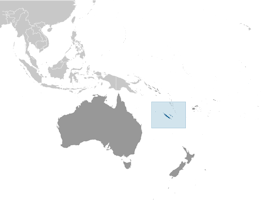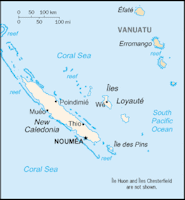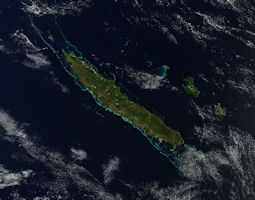New Caledonia
 "Tonight France is more beautiful because New Caledonia has decided to stay part of it," French President Emmanuel Macron said 12 December 2021. With all ballots counted, 96.49% were against independence, while only 3.51% were in favour. But with turnout a mere 43.90%, the result raised questions about the legitimacy of the process. "A period of transition is beginning. Free from the binary choice of 'Yes' or 'No', we must now build a common project, while recognising and respecting the dignity of everyone," the head of state said in a recorded message. Another referendum is expected by June 2023 which will decide on the "project" New Caledonia's people want to pursue.
New Caledonia held its third referendum on independence on December 12, having already twice rejected the proposal. The Noumea Accord ended a deadly conflict between the mostly pro-independence indigenous Kanak population and the descendants of European settlers. It allowed for up to three independence votes by 2022 if requested by at least a third of the local legislature. In a first referendum in 2018, 57 percent voted to remain part of France. In the second, in October 2020, that share decreased to 53 percent.
"Tonight France is more beautiful because New Caledonia has decided to stay part of it," French President Emmanuel Macron said 12 December 2021. With all ballots counted, 96.49% were against independence, while only 3.51% were in favour. But with turnout a mere 43.90%, the result raised questions about the legitimacy of the process. "A period of transition is beginning. Free from the binary choice of 'Yes' or 'No', we must now build a common project, while recognising and respecting the dignity of everyone," the head of state said in a recorded message. Another referendum is expected by June 2023 which will decide on the "project" New Caledonia's people want to pursue.
New Caledonia held its third referendum on independence on December 12, having already twice rejected the proposal. The Noumea Accord ended a deadly conflict between the mostly pro-independence indigenous Kanak population and the descendants of European settlers. It allowed for up to three independence votes by 2022 if requested by at least a third of the local legislature. In a first referendum in 2018, 57 percent voted to remain part of France. In the second, in October 2020, that share decreased to 53 percent.
Pro-independence campaigners boycotted the vote, saying they wanted it postponed to September because "a fair campaign" was impossible with high coronavirus infection numbers. The result could exacerbate ethnic tensions, with the poorer indigenous Kanak community generally favouring independence over the wealthier white community. The main indigenous pro-independence movement, the FLNKS, had called the government's insistence on going ahead with the referendum "a declaration of war".
Separatist leaders in the French Pacific territory of New Caledonia called 21 October 2021 for a boycott of a December independence referendum, urging the government to focus on the Covid crisis. Members of the pro-independence FLNKS group issued the statement a day after they called on France's minister for overseas territories Sebastien Lecornu to postpone the poll during his visit there.
Paris agreed the request from the New Caledonia legislature to hold the consultative referendum under the terms of a decolonisation plan, known as the Noumea Accord, agreed in 1998. But the FLNKS statement said the government -- with the next year's presidential elections in mind -- was insisting on pressing ahead with the vote so as to meet its obligations under the Noumea Accord.
New Caledonia is a French territory located in the Southwest Pacific near Australia. New Caledonia is a special overseas collectivity with a unique, semiautonomous status between an independent country and an overseas department. New Caledonia was made a French Overseas Territory (TOM) in 1946, and became a territorial collectivity (or a sui generis collectivity) of France since 1998. It is not a department like Reunion, Martinique or Guadeloupe, which are seen as integral parts of France. The territory currently sends two MPs to the National Assembly and two senators to France’s upper house of parliament.
New Caledonia consists of the large island of New Caledonia, the Loyalty Islands, the Isle of Pines, and several small, sparsely populated island groups. The capital is Noumea. New Caledonia's moderately developed economy is based on mining and, to a lesser degree, tourism. Tourist facilities can be found throughout New Caledonia, the Loyalty Islands, and the Isle of Pines.
The 2018 referendum could see the first French territory become independent since Vanuatu won its independence in 1980. The Noumea Agreement signed in 1998, which implies gradual transfer of administrative powers to colonies in South Pacific over a time frame of 20 years; and independence referenda between 2014 and 2018.
The date had not been decided, but it had to before November 2018. The only suggestion to date is to have it on 07 October 2018. The 1998 Noumea Accord provided for a phased and irreversible transfer of powers to New Caledonia. The final step would be to give it full sovereignty. This involved mainly justice and police which were French-run, and also defence and foreign affairs. There is no agreement on what a possibly independent New Caledonia could look like. Options included choosing only some of these to then make New Caledonia an associated state. Another idea is to create a federation.
The key issue to resolve was the make-up of the restricted roll of those eligible to vote in the referendum - an issue that had been pending since the 1998 Noumea Accord was signed. The roll had been restricted to long-term residents, that is people who arrived before 1994, and indigenous Kanaks who are on the general roll. On 03 November 2017, after years of manuvering and jockeying a decision was reached on who among New Caledonia’s 275,000 inhabitants can vote.
The pro-French loyalists demanded that all people who were born in New Caledonia will be added to the list if they have been in New Caledonia for the past three years. This resulted in about 4000 names to be added to the roll. The indigenous Kanaks demanded that automatically enrolling all indigenous people. Agreement was found to add another 7000 names.
There are 155,000 voters who are eligible to vote in the New Caledonian independence referendum, and there are two distinct ethnic blocs. There are 84,000 Kanaks, the indigenous population of New Caledonia — almost all of them generally favor independence. And there are 71,000 non-Kanaks who are Europeans and some other people from Pacific countries and Vietnam, China — they favor the status quo, they favor Remain. So there are about 10,000 votes that will decide the outcome of the referendum.
Unrest shook the islands in the mid-1980s as those seeking autonomy clashed with opponents. At least 70 people are thought to have died. In 1987, a French-sponsored independence referendum was boycotted by the Kanaks which led to a 98.3 percent vote in favor of staying with France. That result didn't sit well and tensions and violence continued until the signing of the landmark Matignon Accords by the veteran leader Jacques Lafleur and Jean-Marie Tjibaou of the FLNKS.
The 1998 Noumea Accord, agreed between French "loyalists" and independence supporters drawn largely from the Melanesian Kanak community. Under the 1998 Noumea Accord, over a period of 15 to 20 years Paris would transfer an increasing amount of governing responsibility from France to New Caledonia. The accord gave the nickel-rich Pacific territory of 265,000 increased autonomy and set a referendum for between 2014 and 2018.
Pro-independence activists in New Caledonia gained ground in parliamentary elections 11 May 2014 ahead of a key referendum on independence from colonial power France that could take place any time between now and 2018. Parties that want to keep New Caledonia as part of France - it currently holds a unique position as an overseas possession that formulates its own tax, labor laws and trade policy but not defense or foreign policy - took 29 out of 54 seats in Congress. But supporters of independence won the other 25 seats, two more than in the last elections in 2009.
Local politicians must agree a date for the vote, and if they fail to reach an agreement, Paris will organize it in 2018. "The sovereignty of our country is moving forward," said pro-independence deputy Roch Wamytan. The new government will also have to wrestle with the country's stagnant economy, poor public finances, tax reform, oversight of the mining industry and huge social and ethnic inequality. Remittances from France account for 15 percent of gross domestic product.
New Caledonia boasts [by some estimates] a quarter of the world's known resources of nickel, a core component in the manufacture of stainless steel, rechargeable batteries and coins. But wealth is not evenly spread and backers of independence want major economic reform. Despite these challenges, voter turnout fell to just under 70 percent, down from 72 percent in 2009.
The vote began on Nov. 4 and tension has been simmering as it approaches. Voters in the self-determination referendum will answer the question: "Do you want New Caledonia to gain full sovereignty and become independent?" On 03 May 2018 French President Emmanuel Macron started a highly symbolic visit to New Caledonia, a French territory in the South Pacific that is getting ready to vote on its independence. Macron declined to take a position on the independence vote, although during last year's presidential election campaign he expressed a preference for the territory remaining part of France. By early 2018 the remain campaign wsa ahead, based on electoral results and recent polls. Kanaks, the indigenous inhabitants of New Caledonia, who favor independence, have threatened to boycott the vote.
Of the archipelago's 270,000 inhabitants, about 40 percent are indigenous Kanaks, 27 percent of European origin, the rest defining themselves as mixed race or of other origin. An opinion poll had shown a big majority likely to reject independence in November's vote and some of the loyalist camp has criticised Macron's visit as concentrating too much on Kanak identity.
The West Papua National Committee 14 September 2018 urged New Caledonia's indigenous Melanesians to vote for independence during the upcoming referendum. The Committee, a pro-independence organisation based in Indonesia's Papua region, says it's important that the Kanaks take up the opportunity of decolonisation which it says West Papuans have been denied. Its chairman, Victor Yeimo, told Johnny Blades that West Papuans are closely watching how the Kanaks approach the New Caledonia referendum.
Voters in New Caledonia rejected independence for the Pacific archipelago in a referendum on 04 November 2018, with just over 56% choosing to keep ties with the mainland in a closely-watched test of support for France in one of its most remote territories. On the final count, 56.4 percent of people had rejected the proposition that New Caledonia become independent, in a clear but smaller-than-expected victory for loyalists to the mainland.
As the results came in, French President Emmanuel Macron spoke of his "immense pride" that the Pacific islanders had voted to remain part of the French Republic. "The majority of Caledonians have chosen France: it's a sign of confidence in the French republic, in its future and its values," Macron said in a televised address from the Élysée Palace.
Support for independence from France was much stronger in areas with a large indigenous population, with the vote playing out largely along ethnic lines. Tensions between Kanaks, who tend to favor independence, and the white population, which boiled over into deadly violence in the 1980s. The quasi-civil war claimed more than 70 lives. It led to the 1998 Noumea Accord which paved the way for the steady devolution of powers as well as the referendum. Under the 1998 deal, two further referenda on independence can still be held before 2022.
|
NEWSLETTER
|
| Join the GlobalSecurity.org mailing list |
|
|
|




